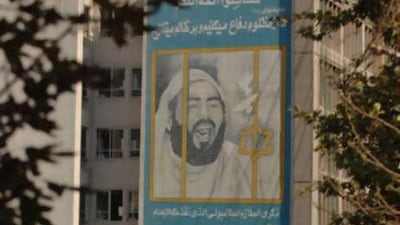CAIRO // The closure of the Cairo office of Iran's state-owned Arabic Al Alam television by Egyptian authorities this week is just the latest sign of tensions between the two regional heavyweights that have festered for nearly three decades. Egypt's ministry of interior said it took the action because the station did not have a broadcasting licence, but it is widely believed that the cause was a documentary about the assassination of Anwar Sadat, Egypt's late president, that said he was killed for signing a peace agreement with Israel.
"Issuing such an ugly movie is an outrageous crime, which violates Islamic Sharia [law]," said the Islamic Research Academy, which is affiliated with Al Azhar, the highest Sunni institute based in Cairo, in a statement. "The rift won't be bridged unless this silly film is burnt." Execution of the Pharaoh, which has not been broadcast in Egypt, shows footage from the assassination of Sadat, proceedings against the assassins and interviews with Egyptian analysts and close relatives of Khaled el Islambouli, the assassin.
When news of the film broke this month it unleashed a wave of official and media reaction. The foreign ministry summoned the head of Iran's diplomatic office in Cairo to protest against the documentary and warned it will have a negative impact on relations between the two countries. Egypt's Shoura Council, the parliament's upper house, voiced the same concerns. And last week, Egypt cancelled a friendly football match with Iran that was set for Aug 20 in the UAE.
Sadat's family also expressed their outrage over the film. According to reports, Roqeya, the late president's daughter, filed legal action against the filmmakers in an Egyptian court, while her step-mother, Gihan, said in an interview with Egyptian TV: "Sadat was a fruitful tree that the Iranians have thrown stones at, which doesn't take anything away from him." Mohammed Hassan el Alfy, the editor of the weekly Al Watany Al Youm, a mouthpiece of the ruling National Democratic Party, said he is working on a movie script titled Khomeini: Imam of Blood, which accuses the Iranian cleric - who led the 1979 revolution and was Iran's political and religious authority until his death 10 years later - of promoting extremism and terrorism.
Sadat was assassinated by Islambouli and other military officers during a military parade on Oct 6 1981. The assassins were executed in 1982. Many in Egypt consider Sadat to be a martyr, while in Iran, Islambouli and his cohorts are celebrated as martyrs for assassinating a president deemed to be a traitor. Egyptian-Iranian relations have a chequered history. In 1939, Fawzia, the sister of the Egyptian King Farouk, married the shah of Iran, bringing the countries closer. But following Egypt's 1952 revolution, the Arab nationalist ideology of Gamal Abdel Nasser alienated the Persian country.
Relations deteriorated after Egypt provided shelter to the shah following his deposition in 1979, before being cut altogether when Sadat signed a peace agreement with Israel later that year. The shah is buried in Egypt and there is a street named after him in the Cairo suburb of Dokki. Egyptian officials have said that having a street in Tehran named after Islambouli, as well as a large mural of him, are two of the main obstacles to restoring diplomatic ties. Iran opened an Interests office in Cairo in the 1990s.
However, commentators said the tension between the mainly Sunni Muslim Egypt and Shiite Iran runs deeper than offensive movies or street names. "Egypt resents the growing Iranian role in the region, which is embarrassing the country a lot," said Fahmi Howeidi, an analyst who has visited Iran dozens of times since the 1979 revolution and wrote the book Iran from Inside. "While Iran is strongly present in Lebanon, Iraq, Syria and Gaza, Egypt is visibly absent. Iran is progressing, while Egypt is regressing, that's why we are seeing campaigns in state media calling them Shiites, Persians and so on," he said. "The film just reveals the bitterness."
Osama Heikal, a columnist with the independent daily Al Masry Al Youm, said there were "three dimensions" to the standoff between Egypt and Iran. "Egypt's strategic relations with the United States, which bans having ties with Iran and which is a major strategic mistake; the ideological differences since Khomeini's revolution; and the historical dispute over Sadat's welcoming the deposed shah," he said.
Mr Heikal said that such fundamental differences made it possible for trivial matters to cause flare-ups. "Has Egypt become so small to the extent that its foreign ministry is shaken by a movie?" he wrote. "How did the research academy get involved in issuing a statement condemning and criminalising the film?" But Mr Howeidi said removing the underlying causes of tension would be extremely difficult.
"Unfortunately, I don't see ties between the two countries being restored or relations improving anytime soon, " he said. @Email:nmagd@thenational.ae

